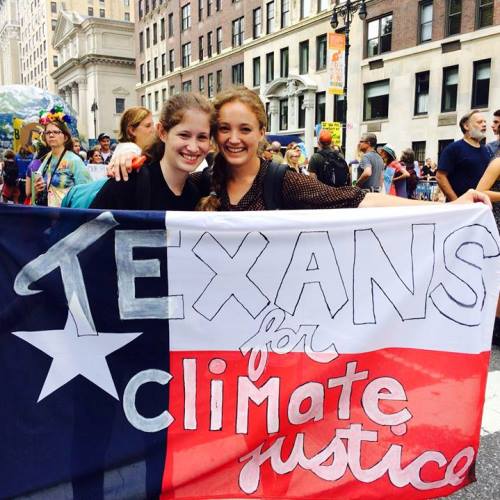Activist alum sounds ‘climate alarm’ in protest

Caroline Spears, right, along with fellow alum Maddie Clayton (both ’13), participated in the People’s Climate March in New York City, Sept. 21. Spears founded the Environmental Coalition of Students in her time at SJS and plans to pursue a career that aligns with her environmental interests. (Courtesy photo)
November 5, 2014
Joining Leonardo DiCaprio, UN Secretary General Ban Ki Moon, former Vice President Al Gore and an estimated 400,000 others, Caroline Spears (’13) paraded through the streets of New York City for five hours during the People’s Climate March.
Spears, a sophomore at Stanford, participated in the march on September 21 with her mother, former headmaster Jim Hendrix and fellow alumni Maddie Clayton and Rachel Jacobe (both ’13). Now estimated to be the fourth largest protest in US history, the march occurred two days before the 2014 United Nations summit in a bid to call attention to the harmful impact of human beings on the climate.
“Climate change is very relevant concern for a variety of people,” Spears said. “For example, we’re already seeing worse droughts in Texas. Our generation particularly will face the negative effects.”
At 12:58 p.m., the protesters fell silent for two minutes before a whistle cued the “climate alarm,” a cacophony of screaming, jumping and crowd waves.
“For me, the climate alarm symbolized that the U.S. government has still not acted to mitigate this threat, despite the fact that around 80 percent of Americans know that climate change is human-caused,” Spears said.
The roughly 1,500 different social justice groups at the march all set aside their differences for the sake of awareness.
“There were anti-nuclear people rallying next to pro-nuclear people and ‘grass-fed beef’ organizations side by side with the vegan group,” Spears said. “They disagreed so much, but they came together for this purpose.”
Spears recalled a video of the US House of Representatives interrogating scientist John Holdren about peer-reviewed climate science. She noticed that their questions showed almost no scientific knowledge or background.
“These are powerful people who have no fundamental understanding of how our energy system works or the basic scientific principles upon which it’s based, which is worrying,” Spears said. “Some make policy decisions completely based on their own personal opinions while labeling science as unreliable. Science isn’t perfect, but you should make policies on the best data you can get.”
Besides walking in the climate march, Spears has also traveled across continents, volunteered and conducted research to improve the environment and others’ understanding of it.
“She has extraordinary leadership skills, and rallies everyone around her in a cause,” said Priscilla Elliott, who sponsored her Science Research and Design (SRD) project about the relationship between butterflies and aristolochic acid plants. “People will just be drawn to her.”
Spears considers a pivotal experience of hers to be the environmental literacy class she took as a college freshman, where she immersed herself in science articles.
“It was the most world-changing class I’ve had,” Spears said. “I try to make sure all my political opinions are factually accurate, and I was impressed by how sophisticated and nuanced the scientific literature on climate change is. It restored my faith in the scientific community.”
Spears’s current research project investigates which ecosystems are altered by different energy sources.
“In the future I’d like to help create an economically powerful and fundamentally sustainable society,” Spears said. “We’re at that point in human history where we have to do both. “We continue to make decisions that assume infinite resources, but as the population grows, that needs to end.”
At SJS, Spears indulged her curiosity about nature by engaging in SRD projects, taking classes such as AP Environmental Science and leading the Environmental Coalition of Students (ECOS). Although the student-driven style of SRD and abundant community service projects gave opportunities for environmental awareness, Spears wanted to see involvement from the whole community.
“One thing SJS doesn’t have is goals of sustainability in its mission statement and culture,” Spears said. “I’ve realized that lot of our peer high schools across the nation have this already.”
Spears, who is majoring in Atmosphere and Energy Engineering, plans to pursue a career that aligns with her environmental interests.
“I’m trying to find a small but rapidly growing energy field that will create the future I want to live in,” Spears said.
For those who pursue solutions to the same issues, Spears advises that education and passion are crucial, along with avoiding a self-centered mindset.
“You feel so much happier doing something that you have a serious passion for,” Spears said.



